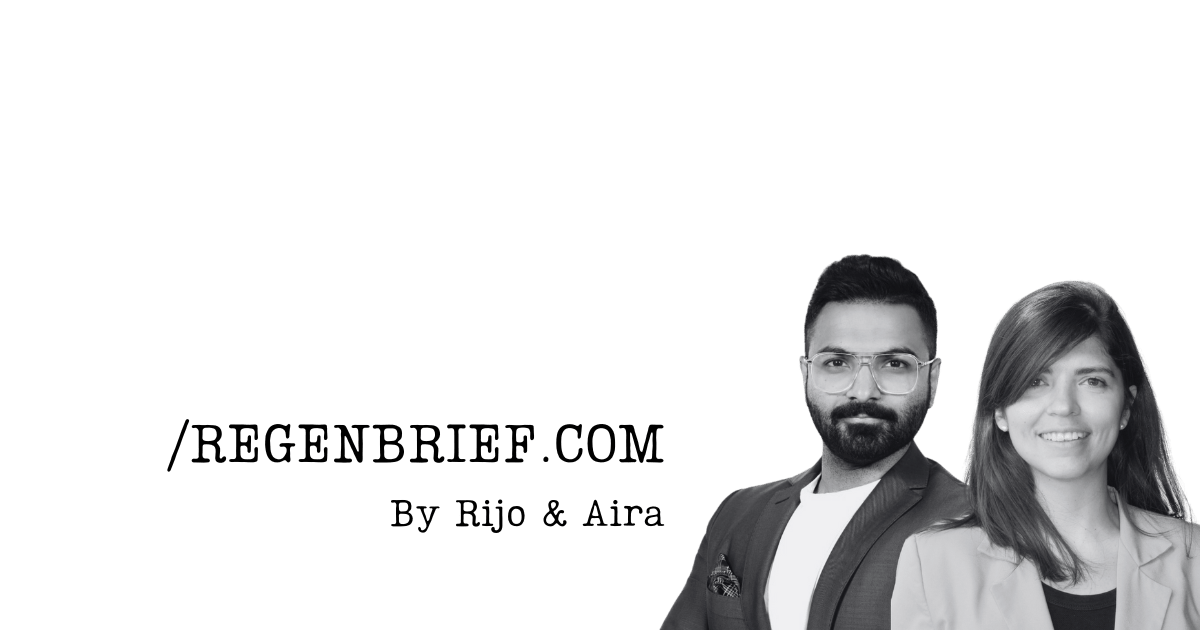Read Time: 4 minutes | Community tracking the real cost of climate chaos
💭 This Week's Question: What happens to global supply chains when Europe's "other Amazon" burns?
"We are entering winter... but we have extreme fires in Spain."
Dear RegenBrief reader,
Something is fundamentally broken when forests burn in winter and we're only just starting to count the real cost.
The Fires Everyone's Ignoring
While the world watches the Amazon, Spain has lost over 382,000 hectares this year—its worst fire season on record—while Portugal has seen 216,000 hectares burned. The fires continue to pose a direct threat to populated areas, with tourist cancellations surging by 90% in affected regions.
But here's what the headlines miss: These aren't just trees burning. They're entire economic ecosystems.
The Iberian Peninsula produces 80% of the world's cork, supports Europe's second-largest wine industry, and anchors supply chains most businesses don't even know they depend on.
The question we're not asking:
If a forest burns in Europe and no one's paying attention, what happens to the wine bottle in your hand, the flooring in your office, and the carbon credits in your sustainability report?

The Real Numbers Behind the Smoke
These fires cost the treasury more than 2.4 billion euros—but that's just the direct firefighting expense. The hidden costs cascade through entire industries:
Cork Industry Impact:
Cork oak forests take 25+ years to produce harvestable bark. A single fire can eliminate decades of growth, affecting everything from wine bottles to spacecraft insulation to sustainable flooring.
Tourism Collapse:
Tourist cancellations surge by 90% as fires continue for weeks, devastating local economies that depend on forest-based eco-tourism and rural hospitality.
Wine Supply Chain Disruption:
The wine industry plays a key role in the sustainability of European cork oak forests. When forests burn, cork prices spike, forcing wine producers to switch to synthetic alternatives—breaking century-old sustainability partnerships.
Carbon Accounting Crisis:
Companies buying forest carbon credits suddenly find their "assets" turned to smoke, forcing expensive recalculations and emergency offset purchases.
The hidden multiplier effect:
Costs related to premature deaths from wildfire pollution range between 0.31 and 1.97% of Portugal's GDP—and that's just the health impact, not the economic ripple effects.

The Amazon Comparison We Need to Make
Everyone knows the Amazon is "the lungs of the planet." But European forests are the circulatory system of the global economy:
Instead of only protecting distant rainforests
We need to protect the forests integrated into our daily supply chains
Instead of focusing only on carbon storage
We need to understand forest-dependent economic networks
Instead of treating forests as separate from business
We need to see them as critical infrastructure for global commerce
The reframe:
The Iberian Peninsula isn't just burning trees—it's burning the foundation of multiple industries that touch every business on Earth.
Where This Hits Your Business
For Every Business Leader:
🔥 Audit Your Forest Dependencies: Spend 30 minutes mapping where your business touches forest-dependent supply chains. Wine for client dinners? Cork flooring in offices? Paper products? Packaging materials? How many "degrees of separation" are there really?
🔥 Track the Cascading Costs: Monitor price increases in forest-dependent products over the next 90 days. Cork, high-quality paper, certain packaging materials, wine, wood furniture. These price signals reveal the true economic impact of forest loss.
🔥 Question Your Carbon Strategy: If your carbon offsets depend on forests, what happens when they burn? Build scenarios for offset availability and pricing as forest fires become more frequent and intense.
🔥 Study Supply Chain Resilience: Choose one forest-dependent input to your business and map out alternative sources. What would it cost to switch? How long would it take? What quality tradeoffs would you face?
🔥 Connect to Place: Visit a local forest or forest-dependent business this month. What industry connections do you discover that weren't visible from your office?
What's Happening Right Now
Three signals the forest economy is more fragile than we thought
🔴 Supply chain breakdown: Tens of thousands of people have been displaced, with entire villages emptied as flames advanced, disrupting local production and processing networks that support global supply chains.
🟡 Industry adaptation: Wine producers are accelerating shifts to synthetic cork alternatives, potentially ending millennia-old forest management partnerships and changing the economics of sustainable cork production.
🟢 Recognition growing: The wildfires pose downside risks to GDP forecasts, with economists finally beginning to quantify forest-economy interconnections that have been invisible in traditional accounting.
This Week's Challenge
Map Your Forest Footprint:
For the next 7 days, every time you touch a forest-derived product (paper, wine, cork, wood, certain textiles), take a photo and note where it might have come from.
By week's end, you'll have a visual map of how much your life depends on healthy forests—and how vulnerable those connections really are.
📚 This Week's Resource: Track real-time European wildfire data through the European Forest Fire Information System (EFFIS) to see the scale of what's burning right now.
💭 Question for LinkedIn: "The Iberian Peninsula is burning in winter. How many forest-dependent products did you use today?"
The Reckoning Coming
We've treated forests like they're disconnected from business. Like they're "environmental issues" separate from economic reality.
The Iberian fires are showing us the truth: There is no economy without ecology.
Reply to this email with the forest connections you discover, or book a conversation to explore how forest fragility might transform your business strategy.
Coming Up
Next week: "The Cork Economy: What Happens When a 25-Year Investment Burns in 25 Minutes?"
Stay regenerative,
— The RegenBrief Team
regenbrief.com | @regenbrief
Let Us Help You Lead the Shift
Whether you're in strategy, ESG reporting, operations or innovation—
This is your moment to shape not just a better business, but a better future.
Curious where regeneration fits into your model?
Let’s explore the possibilities together.
This is more than sustainability.
This is life-centered design.
This is regeneration.



